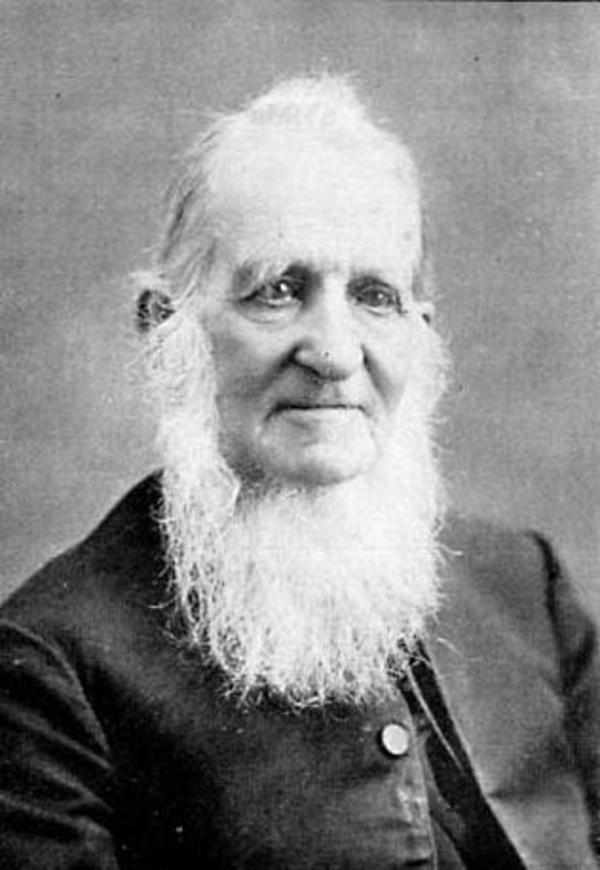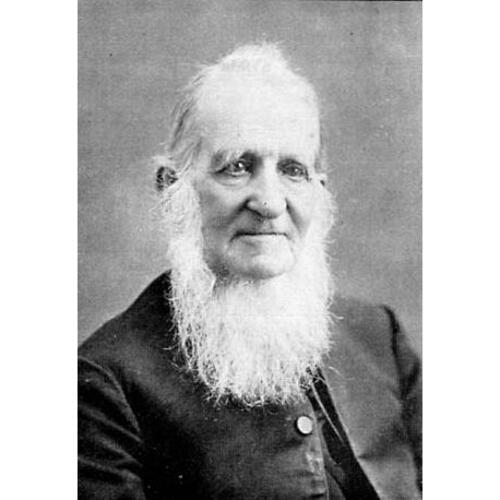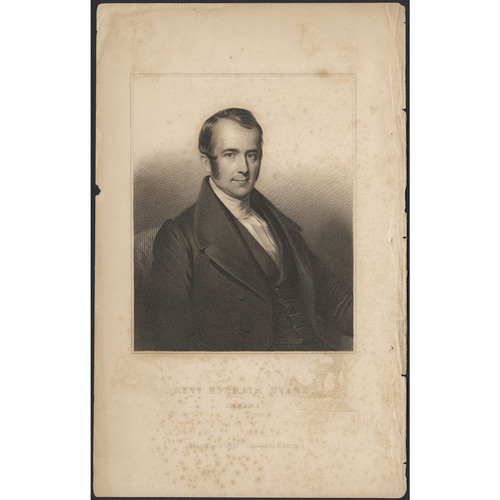
Source: Link
EVANS, EPHRAIM, teacher, Methodist minister, editor, and school administrator; b. 30 June 1803 in Kingston upon Hull, England, son of James Evans and Mary —; brother of James*; m. first 27 June 1832 Charlotte Shaw, daughter of Æneas Shaw*, and they had four daughters and a son; m. secondly 16 July 1874 Mary E. Gunn, daughter of Robert Gunn of Wallacetown, Ont., and she survived him with a young family; d. 14 June 1892 in London, Ont.
Ephraim Evans received some formal education at a boarding-school in Lincolnshire. In 1820 he accompanied his parents to Lachute, Lower Canada, and four years later he moved to Upper Canada to teach school. There, despite a strict Methodist upbringing, he began work on a novel. In 1827, however, he was converted at a revival in Bastard Township and almost immediately became a preacher on the Kingston circuit. In 1830 he was ordained, serving successively at Cobourg, Niagara (Niagara-on-the-Lake), Stamford (Niagara Falls), and Ancaster. During 1833–34 he stumped the western part of Upper Canada, raising money for the Methodists’ projected Upper Canada Academy.
In 1833, largely at the instigation of William*, John*, and Egerton* Ryerson, the Canada Conference of the Methodist Episcopal Church placed itself under the jurisdiction of the British Wesleyan Conference. The British, who had a tradition of deference to constituted authority, were distressed by the stridently reformist tone of the Canadians’ Christian Guardian. To reassure them, the Ryersons, seeking a conciliatory editor, engineered Evans’s election in 1835. Never was an editor’s position more difficult. Agitation over the clergy reserves was at its height, and the Methodist conference was claiming its right to an equal share even while it was disclaiming any intention of accepting government money for other than educational or “general religious” purposes. Evans defended this ambiguous policy as well as he could, resisting the claims of the Anglicans to exclusive possession on one flank while warding off attacks on another from continuing Methodist Episcopals such as James Richardson* who insisted on outright voluntarism. He was less successful in placating reform elements within the main Methodist body, for he was an ultra-loyalist who saw in the province only two parties, “one seeking to preserve the colonial relationship with Great Britain, and the other to end it.” A determined adversary of slavery, in 1837 he became secretary of the newly formed Upper Canada Anti-Slavery Society. This stance, which led him to condemn the equivocal position of American Methodism on the subject, gave further offence at a time when recognition of the Canadian body by the Americans was important. In 1838 it was determined, with the concurrence of the British conference’s superintendent of missions in Upper Canada, Joseph Stinson*, that Egerton Ryerson should resume the editorial chair. As recompense Evans became chairman of the London district.
Even before Evans’s replacement, Ryerson’s objection to British Wesleyan demands for a purge of members who had sympathized with the rebellion of 1837 was opening a breach that would culminate in 1840 in the dissolution of the union. Evans’s position in this critical period was never in doubt. Convinced that only the presence of “true Wesleyanism” could preserve the British connection, he attributed the Ryersons’ earlier support of the union merely to a desire to exclude British missionaries from the province. Casting his lot with the British conference, he served its churches in Hamilton and London and in 1843 became secretary of its district meeting.
In 1847 the two Methodist bodies were reunited. Evans was reluctantly convinced that otherwise British Wesleyanism had no future in Upper Canada but also that his uncompromising stand had brought his usefulness there to an end. In the following year the British conference rescued him from his predicament by appointing him – on ten days notice – general superintendent of its work in the Maritime provinces. He also served as its missionary in Halifax until 1852 and then in Charlottetown until 1854. During his term of office he organized sustentation and contingent funds, piloted bills of incorporation for chapel trusts and the local district meeting through the Nova Scotia legislature, and was instrumental in securing the formation of a semi-autonomous conference in 1855. Less happy was a three-year tenure as governor and chaplain of the Wesleyan academies at Sackville, N.B., where principal Humphrey Pickard* did not readily cede any of his previously unquestioned authority.
In 1857, with old wounds healed, Evans applied for a Canadian posting. If he hoped for a measure of relaxation, he was quickly disappointed. After a year in Kingston he was chosen to lead a party of four Methodist ministers, including Edward White*, to the Pacific coast, where the gold-rush had resulted in a sudden influx of population. On 10 Feb. 1859 he reached Victoria, which was to be his headquarters. The next month he led the party on a gruelling canoe trip up the Fraser River to Yale and back. In 1862 and 1863 he visited the new mining areas in the Cariboo, but a broken arm suffered in November 1864 brought his ambitious program of travel to an end. From 1866 to 1868 he served the less strenuous Nanaimo circuit, returning then to Ontario for pastorates at Hamilton and Yorkville (Toronto). From 1872 to 1875 he was in charge of the Mount Elgin Industrial Institution for Indian students at Muncey, finally settling in London, where for the next 14 years he was secretary of the Western Ontario Bible Society.
Evans was typically described by contemporaries as a man of military bearing, holding himself as erect as a soldier. Formidable in debate, he was also unfailingly courteous. On his first circuits he was instrumental in leading several revivals. In later years, although respected as a preacher of erudition and literary elegance, he made his mark chiefly as an administrator who could be trusted to perform difficult tasks well. A congregation to which he was appointed was likely soon to boast “a spacious and elegant chapel.” His last building, a parsonage at Muncey, he painted himself when over 70 years of age. In the Maritimes he was remembered as having introduced a measure of organization to a body that previously had little conception of it. While Evans’s reputation may have suffered somewhat from his espousal of unfashionable ecclesiastical and political views, his integrity, his ability, and his devotion to Methodism were always beyond question.
UCC-C, Biog. files. [J. S. Carroll], Past and present, or a description of persons and events connected with Canadian Methodism for the last forty years; by a spectator of the scenes (Toronto, 1860). Wesleyan Methodist Church, Minutes of the conferences (London), 1893: 23. Wesleyan Methodist Church in Canada, Missionary Soc., Annual report (Toronto), 1858–68, 1872–74. Christian Guardian, 1831–92. Cornish, Cyclopædia of Methodism. S. P. Rose, “Ephraim Evans, D.D. (1803–1892),” The chronicle of a century, 1829–1929: the record of one hundred years of progress in the publishing concerns of the Methodist, Presbyterian, and Congregational churches in Canada, ed. L. [A.] Pierce (Toronto, [1929]), 27–32.
Cite This Article
John Webster Grant, “EVANS, EPHRAIM,” in Dictionary of Canadian Biography, vol. 12, University of Toronto/Université Laval, 2003–, accessed February 19, 2026, https://www.biographi.ca/en/bio/evans_ephraim_12E.html.
The citation above shows the format for footnotes and endnotes according to the Chicago manual of style (16th edition). Information to be used in other citation formats:
| Permalink: | https://www.biographi.ca/en/bio/evans_ephraim_12E.html |
| Author of Article: | John Webster Grant |
| Title of Article: | EVANS, EPHRAIM |
| Publication Name: | Dictionary of Canadian Biography, vol. 12 |
| Publisher: | University of Toronto/Université Laval |
| Year of publication: | 1990 |
| Year of revision: | 1990 |
| Access Date: | February 19, 2026 |




